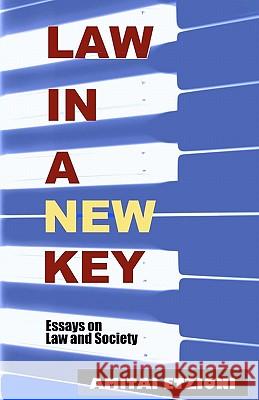Law in a New Key: Essays on Law and Society » książka
Law in a New Key: Essays on Law and Society
ISBN-13: 9781610270441 / Angielski / Miękka / 2011 / 268 str.
A book for thoughtful readers--and not particularly lawyers or scholars of law and society--who are engaged in the issues of the day and want something other than "easy" answers from the right and left. Most issues of law and social policy can be understood better through a lens that balances rights and interests--and protects all of us while protecting each of us--says renowned communitarian sociologist Amitai Etzioni in his latest of 30 books. In Law in a New Key, Etzioni addresses hot-bed issues of terrorism, drone warfare, airport security and scanners, government surveillance, DNA banks, norms of social disapproval and forgiveness, human rights, and respect for ethnic cultural differences. He shares his perspective as one who has fought in war and part of a resistance, and then later became a professor at Columbia University and George Washington University. The perspective and his decades of academic research persuaded him that the answer to thorny legal and policy issues is found neither in unyielding devotion to individual rights at all costs nor in reflexive empowerment of the state in times of crisis and pain. The answer is in moral dialogs, respect for the basic right to life and security, responsible checks on power, and a balancing of interests in a world of pundits and partisans who favor one right. What good is the right to privacy if the basic right to live is sacrificed as the right-holder is blown out of the sky? If new technologies make it possible to conduct terrorism and crime without the law catching up to them? What happens when respect for one religious position means choosing among religious positions? A collection of 15 trenchant essays drawn from the popular press and academic journals, yet accessible to a spectrum of readers who care about the key issues of the day and see the complexity in them, Law in a New Key takes a fresh look at important topics that need examination through a community-concerned lens. The frame gives contours and substance to today's debates without offering the usual entrenched policy solutions of parroting partisans. Etzioni asks such questions frankly, and on a variety of topics that matter. Rights carry responsibilities, and freedom and human rights must put living first--in a world that does not always concede that self-evident proposition. It is book about law and society whose time has come. For many readers, the social and legal notes he plays will finally sound in their register.











